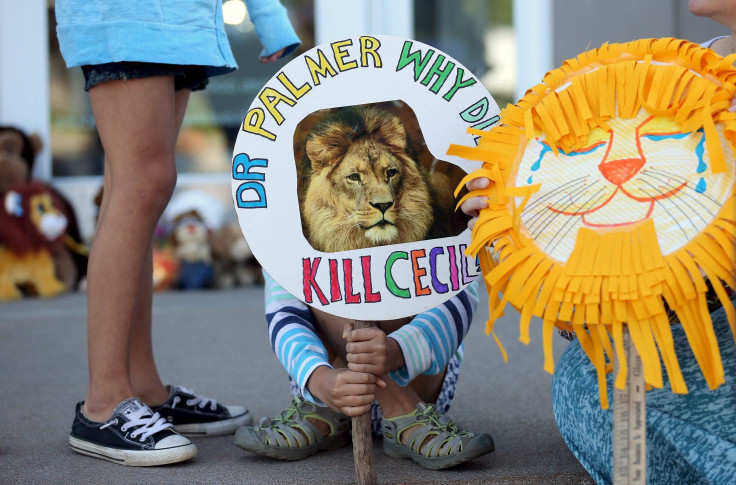Cecil The Lion Case Charts New Territory For US Wildlife Law

A 115-year-old U.S. law aimed at preventing unlawful animal trafficking may be difficult to enforce in the case of an American hunter who killed a celebrated Zimbabwean lion.
The killing last month of 13-year-old Cecil, a rare black-maned lion, sparked international outrage among animal lovers. Walter Palmer, a Minnesota dentist, has admitted to killing the lion, but has said through a publicist he thought the hunt was legal.
Palmer, who has said he "deeply regrets" killing Cecil, has not been charged in Zimbabwe. A government minister in the African country has called him a "foreign poacher" and said he should be extradited.
The U.S. Fish and Wildlife Service said on Tuesday that its probe is continuing, but did not comment further. Last week, the agency said it was contacted by a representative of Palmer, but provided no additional details.
A source close to the probe said the agency was looking for possible violations of the Lacey Act. But legal experts say the case may be difficult to prosecute because the law has rarely, if ever, applied to hunters who do not import parts of the animals they kill.
The Justice Department said it would not comment on whether the case could be formally prosecuted until the wildlife agency concludes its investigation. The Lacey Act was enacted to help U.S. states enforce their hunting regulations. Over time it has been expanded and it now prohibits the import, export, sale, acquisition, or purchase of animals protected by U.S. or foreign laws.
Legal experts said that any effort to bring Lacey Act charges in the Cecil case would be complicated by the tenuous link between the hunt in Zimbabwe and the United States.
"There has to be a connection to the United States," said James Rubin, an attorney with the Dentons law firm who has advised clients on Lacey Act compliance.
PROSECUTIONS HAVE INVOLVED ANIMAL PARTS
Typically, Americans have been prosecuted under the Lacey Act for bringing animal parts obtained illegally abroad into the United States, or being part of an operation that does so.
Cecil's remains, including the skin and head, are still in the custody of the Zimbabwean police, Zimbabwe's national parks authority said.
The Fish and Wildlife Service has been investigating whether Palmer conspired to bring parts into the country, the source close to the case told Reuters.
To support conspiracy charges, the government would likely be reviewing money transfers, phone calls and other correspondence, seeking evidence that Palmer had made plans to bring body parts into the United States, said the source close to the case.
The Justice Department has no known recent precedent for prosecuting American hunters for actions abroad who do not import animal parts, said two department officials.
Daniel Rohlf, a professor who teaches wildlife law at Lewis and Clark Law School, said that on this issue, "The United States is reluctant to meddle in the affairs of other countries, so that's why we don't criminalize U.S. citizens hunting in foreign countries."
Past charges for conspiracy to violate the act include a 2014 case against the Out of Africa safari group, which sold illegal hunts of rhinoceros in South Africa, while running an office out of Alabama.
The United States is now in the process of extraditing two defendants, Dawie and Janneman Groenewald, from South Africa in that case. The two men have been charged with 17 counts, including one count of conspiracy and six counts of illegal wildlife trafficking in violation of the Lacey Act.
Palmer's guide in the hunt that killed Cecil, Theo Bronkhorst, told NBC News on Tuesday that he did nothing wrong. Bronkhorst was charged in Zimbabwe last week with failing to supervise, control and take reasonable steps to prevent an unlawful hunt. He pleaded not guilty to the charge.
Game park owner Honest Ndlovu, who is also accused of assisting Palmer, was not charged and parks officials said he would first testify for the state and be charged later.
© Copyright IBTimes 2024. All rights reserved.




















